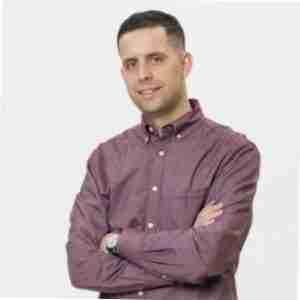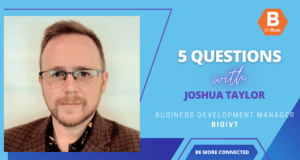
5 Questions with Nick Droste, Emergent BioSolutions Postfill Manufacturing Supervisor
“5 Questions With……” is a weekly BioBuzz series where we reach out to interesting people in the BioHealth Capital Region to share a little about themselves, their work, and maybe something completely unrelated. This edition features 5 Questions with Nick Droste, Postfill Manufacturing Supervisor at Emergent BioSolutions.
Nick Droste is part of the postfill manufacturing team at the Emergent BioSolutions Baltimore Camden site, where he leads visual inspection operations for Emergent’s growing Contract Development Manufacturing and Organization (CDMO) efforts and in support of their new partnership with the Biomedical Advanced Research and Development Authority (BARDA) COVID-19 vaccine development operations. At the Camden site, he has spearheaded training initiatives and continuous improvement innovations to help establish Camden as a visual inspection and packaging center of excellence.
Nick has two decades of experience in a variety of leadership roles during a career in the United States Army. As a Korean and Persian language analyst, he led military intelligence teams around the globe, including combat tours in Iraq and Afghanistan. During these tours abroad, Nick learned the value of medical countermeasures and life-saving tools that were provided by the life sciences industries. Prior to his retirement from the Army, Nick completed a BS in Psychology and is currently in his last year of graduate school at the University of Baltimore, pursuing an MS degree in Industrial and Organizational Psychology.
1. Tell us about yourself and your role at Emergent
As a veteran advocate, Nick has dedicated his free time with volunteer support to a variety of veteran service organizations including Vets2Industry, Hire Heroes USA, Still Serving Veterans, MVPVets, HireMilitary, and Student Veterans of America. He is also a member of the Society for Industrial and Organizational Psychology (SIOP) Military and Veteran Task Force, helping to provide a voice for veterans in the greater I/O Psychology community. Nick is passionate about helping service members navigate the difficulties of military transition, as well as helping organizations recognize the value of veteran outreach and support.
At Emergent I am a postfill manufacturing supervisor: I lead an incredible visual inspection team that performs quality control inspections on the products we make in support of our pharmaceutical CDMO operations. We call ourselves “the last line of defense” for contributing to the safety of the products we make on-site. I also have been working with our amazing HR team to build up our veteran outreach capabilities and improve our workforce.
2. You served with the US Army for two decades. How does that experience translate into the biohealth space?
I often hear people refer to the skills we learn in the military as “soft skills,” but I think they are anything but. Leadership, teamwork, attention to detail, being able to remain calm under pressure, adaptability, and being willing to sacrifice for something greater than yourself are just a few of the “soft skills” that military service can bring to the table.
Personally, I had over 20 years of experience in talent management, leading operations, selections and promotions, quality control and analysis, training development, and creation of standard operating procedures that all lend themselves extremely well to a variety of roles in the biohealth space. The language training and the cultural knowledge that I gained in the military come in handy both with international clients and leading an extremely diverse team. In addition, my experiences in Korea, Iraq, and Afghanistan provided me with a profound level of appreciation for the development of medical countermeasures and the various improvements to our life-saving tools that were provided by the health industry.
3. Talk about what the Military World and the BioHealth World could learn from each other.
This is a great subject, one that I could talk about for days! In my opinion, the most important lesson for both populations is the knowledge of how complementary they are to each other.
The biohealth world vitally needs leaders who have first-hand knowledge of the importance of the products being made. The amount of potential that a transitioning veteran has for an organization is immense, especially if the organization understands the many different opportunities that veterans can use to augment their professional capabilities. Free training and certifications such as Lean Six Sigma, human resources, and Project Management, access to the G.I. Bill, tax incentives, and free internship opportunities are just the tip of the iceberg. Knowing the value of creating veteran talent pipelines is definitely a vital lesson our industry needs.
Conversely, the military community needs to know about the vast amount of possible careers that are available to them in the life sciences industries. The transition from military to civilian life can be very difficult, but having a fulfilling mission like “To protect and enhance life” really helped me to embrace that transition rather than fight against it. What I found after starting to work at Emergent was how many veterans there already were in the biohealth industries-and almost to the person, they all had just sort of stumbled upon the industry and fallen in love with it. It really made me think of how much more we could be if we established something more to help transitioning service members know that such a career is a viable option.
4. You’re an advocate for Veterans. Tell us more about that and how others can support your work.
I am an advocate for veterans not just because I am one. The loss of a driving mission that often occurs when a servicemember departs the service can be a terrible load that directly contributes to the veteran suicide epidemic. It is important to understand that this should not be viewed as a negative aspect: we care about making a difference for others so much that the absence or loss of that ability can be too much to bear.
Others can support that work by learning about the many ways companies can support both transitioning veterans and the veterans already within their workforce: find those veterans in your workforce and learn their stories; help create veteran resource groups within your organizations; learn about veterans service organizations and choose a few to support as an organization; create a veteran hiring outreach program, and definitely learn everything you can about how to use the Department of Defense SkillBridge program-a free internship program for transitioning service members that organizations can use to create that veteran hiring pipeline I mentioned.
5. What are you interested in that most people haven’t heard of? Tell us about it.
I am in my last year of graduate school, pursuing a Master’s in Science in the field of Industrial and Organizational Psychology. When people hear the term “I/O psychology,” their response is usually, “Oh cool! Uh, what is that, exactly?”
To me, the field of I/O Psychology is all about using scientific methodologies to help organizations and their people maximize their operations and outcomes. Like a therapist helps an individual, an I/O Psychologist treats an organization. Helping organizations and their people both reach their true potential cannot happen without both parties understanding their roles and being passionate about the mutual benefits that exist within that dynamic, so I find many rewards in developing practices that help organizations recognize the value of their employees, and that assist employees in realizing their potential and increasing their engagement with the organization.
Thank you to Nick Droste for participating in the ‘5 Questions with BioBuzz’ series and stay tuned for more interviews with others from across the BioHealth Capital Region and beyond.




